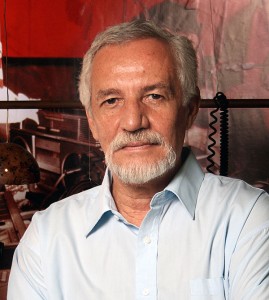Revolutionary Museum Director to Display the Cultural Preservation of Salvadorans
When a country is terrorized by war, its people and history are sometimes forgotten. In an effort to preserve El Salvador’s historic memory, Carlos Henríquez Consalvi — a Venezuelan author, journalist, radio maker and museum director — created the Museum of World and Image (Museo de la Palabra y la Imagen) (MPI) after the Salvadoran civil war.

Venezuelan author, journalist, radio maker and museum director Carlos Henríquez Consalvi will host a presentation at CSUN.
Photo credit: Oviatt Library
Consalvi will give a presentation displaying documents, images and videos from the MPI to California State University, Northridge students on Friday, April 6, from 2 to 4 p.m. in Delmar T. Oviatt Library’s Jack & Florence Ferman Presentation Room. The library is located in the center of campus, located at 18111 Nordhoff St. The public is invited to attend the event.
“Since the time of the war, Consalvi has worked to inform the population about what was happening in spite of the censorship,” said Central American Studies professor Beatriz Cortez. “He established the Museum of World and Image after the war ended to build memory so that people could remember what happened.”
During the war, Consalvi went by the alias, Santiago, and established the radio station Radio Venceremos (We Shall Overcome Radio) — an underground radio station that broadcasted news and educational programs from the warzone within the mountains in Morazán, El.
After the war, Consalvi established MPI, which holds the complete Radio Venceremos archive, more than 50,000 photographs, documents and personal testimonies of the civil war in El Salvador. The museum highlights the role of memory, social justice, human rights and non-official histories.
At the event, Consalvi also will discuss history, memory, and identity, as well as how diaspora — the dispersion of people from their original homeland — affected people in the past and present.
“I think it’s really important that he is coming here once more to have a conversation with us,” said Cortez. “Salvadorans that are part of diaspora need to be part of the historical memory of the war and immigration.”
Consalvi received the Prince Claus Award for outstanding achievements in the field of culture and development. He was a member of the United Nations Educational, Scientific and Cultural Organisation’s Memory of the World Programme Committee for Latin America (MOWLAC) from 2014–2017.
The event is co‐sponsored by the Oviatt Library, Mike Curb College of Arts, Media, and Communication Distinguished Speaker Series, the Department of Central American Studies, and the Department of Journalism.

 experience
experience